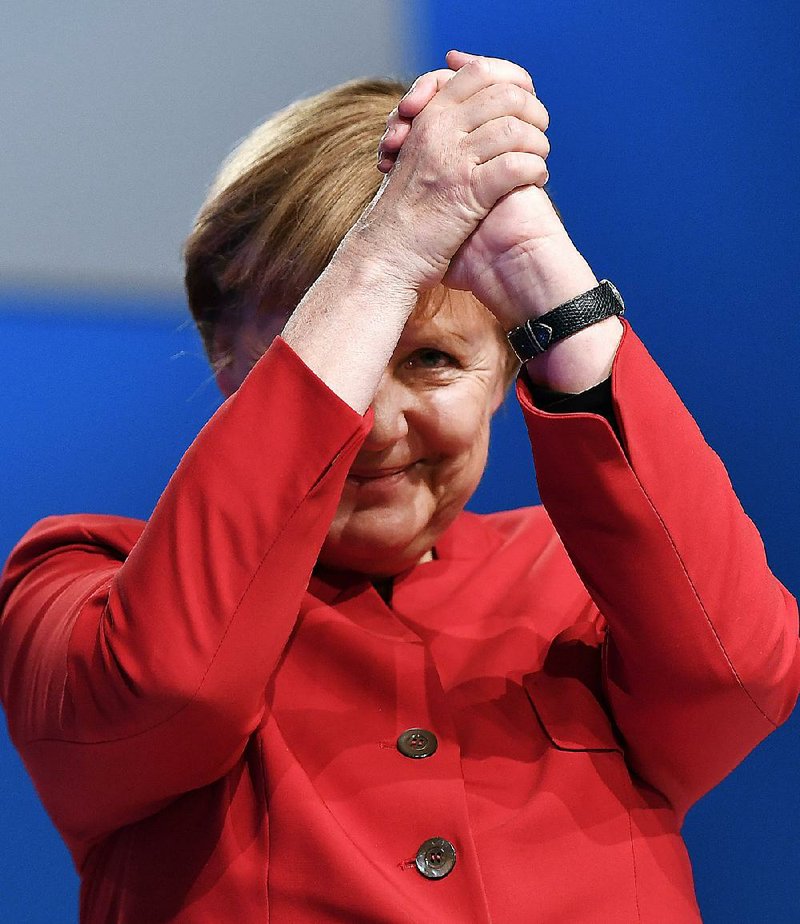Chancellor Angela Merkel called for a ban on full-face veils and said she'll protect Germany against future migrant waves, reaching out to critics of her liberal migration policy as she asked a convention of her Christian Democratic Union to back her bid for a fourth term.
Christian Democratic delegates broke out in applause and cheers after Merkel gave her strongest backing yet to a ban on clothing such as the burqa worn by Muslim women. Even so, delegates re-elected Merkel as party chairman with the lowest support of her 11 years as chancellor, with 89.5 percent voting in favor compared with 96.7 percent two years ago.
"We show our faces," Merkel, 62, said in an 80-minute convention speech in the western city of Essen on Tuesday. "Full-face covering is not appropriate with us -- it should be banned." She also said the mass influx of asylum seekers such as the estimated 890,000 who entered the country in 2015 "should never be repeated."
After more than a year in which the chancellor has faced unprecedented criticism for her open-borders position on migrants, Merkel told delegates she thought hard about whether to run again and it wasn't "a trivial decision." Looking ahead to federal elections due next fall, she positioned herself and her party as pillars of stability in a region buffeted by a rise in populist movements aiming to displace established parties.
At the same time, she said she wants Germany to be a tolerant, diverse country that's open to the world, including the global economy, and compassionate toward people truly in need of shelter.
"The world hasn't become stronger in 2016, but weaker and less certain," Merkel said.
Among those targeted for criticism by the chancellor were financial markets and "big corporations" that seek to minimize their taxes, whose practices she said breed cynicism and have "nothing to do with a social market economy."
"Every financial center, every financial product must be subject to regulation," Merkel said.
A group of Christian Democratic officials last summer put pressure on Merkel to adopt language calling for a ban on veils that cover a woman's face and body. After a debate in the party about the legal feasibility of a ban, a compromise called for bans in certain public places.
Merkel's stance "was something our delegates wanted to hear," Jens Spahn, a deputy finance minister and member of the party's national leadership, said in an interview. "It was very clear that we don't want full veils here in Germany."
Merkel's speech put her publicly in line with the full party leadership's draft resolution for the convention, which says: "We reject full covering. We want to ban it using all legal possibilities, just as we do for underage marriage."
While the Democratic Union leads in all national polls, Merkel is facing some of the strongest headwinds of her chancellorship as she seeks a fourth term. Her only lower score as party chairman was 88.4 percent in 2004, when she was opposition leader. Among the obstacles ahead is meshing her refugee policy with calls by the Christian Social Union, the Christian Democratic Union's Bavarian sister party, for a cap on migration.
"We will fight for Angela Merkel to have a strong majority" in next year's election, Manfred Weber, a Social Union member who heads the Christian Democratic bloc in the European Parliament, said in an interview. "It was normal that we have sometimes different opinions."
With no obvious successor in her party and international standing built up over more than a decade, Merkel still has political capital. That didn't prevent several critics from taking the floor to criticize her for driving voters to the anti-immigration Alternative for Germany.
"A big segment of core voters have been put off," said party member Christine Arlt-Palmer. "This is terrain that we won't win back."
A Section on 12/07/2016

